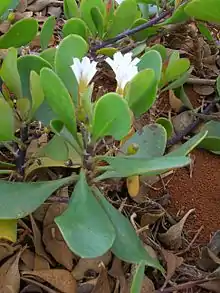Scaevola coriacea
Scaevola coriacea, the dwarf naupaka,[4] is one of the ten Scaevolas (flowering plants in the Goodenia family, Goodeniaceae), that are endemic to Hawaii.[5]
| Dwarf naupaka | |
|---|---|
 | |
| Scientific classification | |
| Kingdom: | Plantae |
| Clade: | Tracheophytes |
| Clade: | Angiosperms |
| Clade: | Eudicots |
| Clade: | Asterids |
| Order: | Asterales |
| Family: | Goodeniaceae |
| Genus: | Scaevola |
| Species: | S. coriacea |
| Binomial name | |
| Scaevola coriacea | |
| Synonyms[3] | |
|
Lobelia coriacea Kuntze | |
It was first described in 1842 by Thomas Nuttall, [2][1] and its specific epithet, coriacea, derives from the Latin, corium, which means leather, and describes the tough, thick, leathery leaves.[6]
Description
Dwarf naupaka is a low, flat-lying perennial herb. Its older stems are somewhat woody, and the succulent leaves are oval-shaped, relatively far apart, and smooth or somewhat scaly with rounded tips. Flowers occur in branched inflorescences from the point of leaf attachment in groups of one to three.[7]
Conservation
Today, dwarf naupaka exists only on Maui and two offshore islets. Historically, it could be found on six islands. The total population is less than 300 plants, making dwarf naupaka an endangered species.[7][5]
| Wikimedia Commons has media related to Scaevola coriacea. |
References
- "Scaevola coriacea". Germplasm Resources Information Network (GRIN). Agricultural Research Service (ARS), United States Department of Agriculture (USDA). Retrieved 21 November 2009.
- Nuttall, T. (1842) Transactions of the American Philosophical Society 2, 8: 253 Retrieved 24 July 2019.
- "Scaevola coriacea Nutt. | Plants of the World Online | Kew Science". Plants of the World Online. Retrieved 25 July 2019.
- "Scaevola coriacea". Natural Resources Conservation Service PLANTS Database. USDA. Retrieved 6 November 2015.
- "Hawaiioirc.org | Offshore Islet Restoration Committee (Hawaii): Plants". Retrieved 24 July 2019.
- "coriaceus,-a,-um". www.plantillustrations.org. Retrieved 25 July 2019.
- "Scaevola coriacea ". CPC National Collection Plant Profiles. Center for Plant Conservation. 2008-01-29. Retrieved 21 November 2009.
